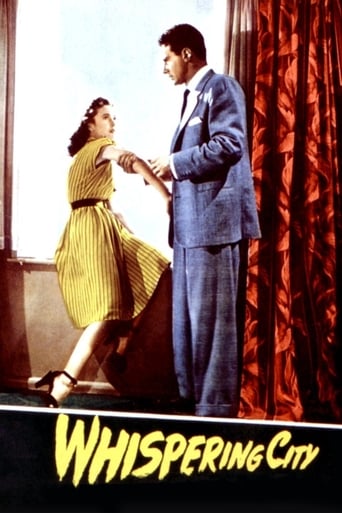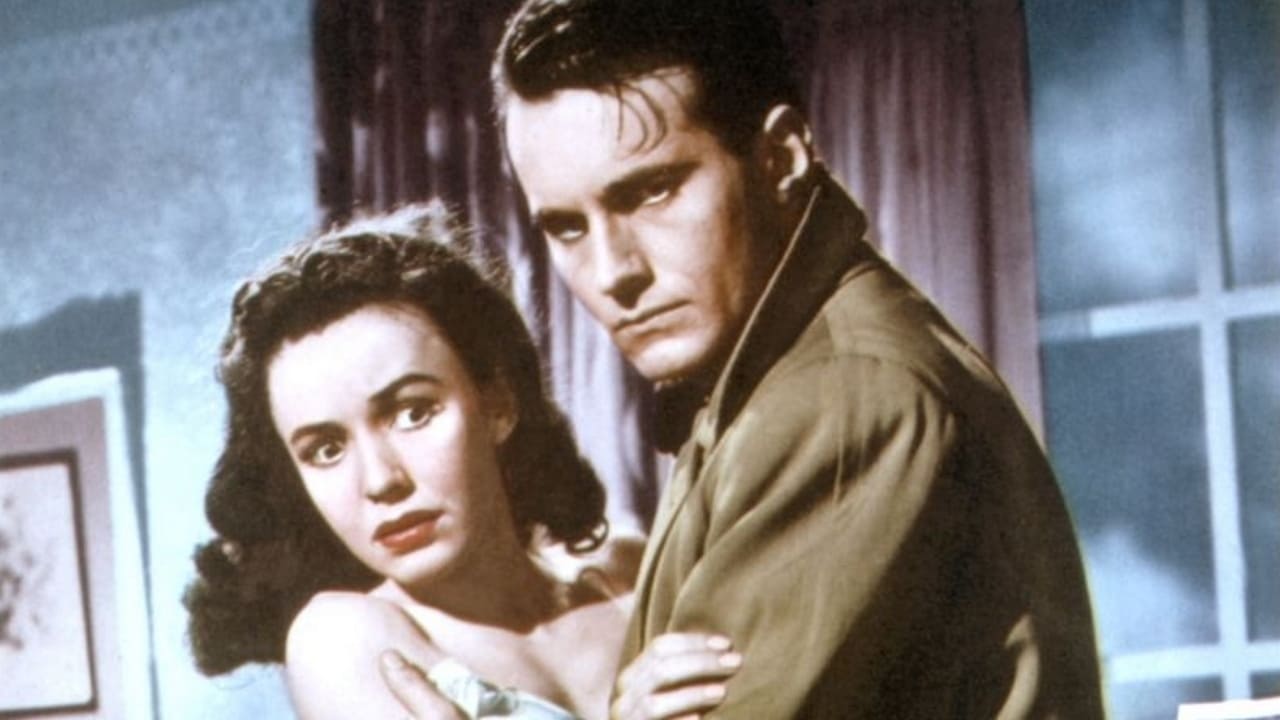Robert J. Maxwell
Mary Anderson is a reporter investigating an old murder case in Quebec. Paul Lukas is a high-end lawyer who was the murderer and, for some reason, he resents Anderson's poking into the crime and "opening old wounds." Boy, would he like her to disappear.Lukas has a friend, Helmut Dantine, who is a brilliant musician married to a shrew. One night, after a particularly bitter argument with her, Dantine shows up plastered at Lukas's house and Lukas puts him to bed. Then he sneaks out into the night with the intention of murdering the shrew, blaming it on Dantine, and blackmailing Dantine into murdering Anderson so that she won't uncover Lukas's earlier crime. Got that? It turns out to be unnecessary for Lukas to murder Dantine's wife because she has already committed suicide and left a note behind, explaining that she couldn't go on living any longer because her nails never dried quickly enough.Lukas, his mind ever dirty, pinches the suicide note and arranges a few other details to make Dantine look like the murderer. The blackmail plan goes ahead. Dantine can't remember a thing from the night before. Lukas tells him that he showed up drunk and bragged about having killed his wife. Lukas is in a position to get him out from under the threat of the hangman's noose, but only if he takes Mary Anderson to Montmorency Falls and throws her in.A slight problem develops when Dantine and Anderson fall in love. Lukas's scheme unravels.It's a B feature and the usual clichés are not avoided. Mary creeps through a darkened house with a candle while an eyeball peers at her through a crack in the door -- that sort of thing. But it transcends the usual cheap mystery if only because it's set and photographed in Quebec, the most nearly European city in North America. The director doesn't go out of his way to give us a tourist's eye view, as Hitchcock did in "I Confess." There is no shoot out in the Château Frontenac. But we see enough of the location to appreciate its verticality and its stony elegance and sometimes severe beauty.Paul Lukas plays the kind of villain he did in "The Lady Vanishes." He's perfectly reasonable, he appreciates the splendor of Dantine's piano concerto -- of which we hear quite a lot -- but he's ruthless too and a little mad.Dantine has chiseled features, like a Bernini sculpture, but their default position is a stern and unyielding frown. He was locked into roles like this because he just couldn't do anything else. On those rare occasions when he tries to smile, the viewer can almost hear the agonized creak of unused mechanisms.Mary Anderson isn't a bravura performer either. She's not stunningly beautiful, not sexy, and her acting achieves a certain plateau and then quits. The thing is that she is eminently likable. She's petite, skinny, and vulnerable. One can imagine being nurtured by her -- she was the nurse in Hitchcock's "Lifeboat" -- but she could never play the scolding wife, for instance.It's a diverting and pleasant feature with no pretensions.
dbborroughs
Female reporter investigates odd goings on in Montreal. Convoluted plot line about deaths that are really murder, suicide that is made to look like murder and numerous other twists and turns require a great deal of attention to help unknot it. I tried to watch this the night before last must too late at night and began to nod off. I tried again while I made it to the end I don't know how I really felt because where some things need to be followed its clear who the villain is from the start. That is not in and of itself a bad thing, when done right, its just that the film seems to treat it as a big secret when its not. As I said I really don't know what I felt about the film. If you want to see Montreal in the winter I'd give the film a shot, beyond that its your own choice. (Leave a comment)
JohnHowardReid
This unusual film noir, photographed in Quebec by Guy Roe (and his astute second unit cameraman, Charles Quick), pre-dates Hitchcock's I Confess by several years. Hitchcock undoubtedly saw the movie because he used its main musical idea in his remake of The Man Who Knew Too Much. In this original, however, the beautiful "Quebec Concerto" by Andre Mathieu is heard throughout, not just at the climax, because the lead male, Dantine, cleverly plays the composer. Other roles are distinguished by the lovely Mary Anderson (later to steal Last of the Buccaneers) as heroine, Paul Lukas (credibly cast as a shifty patron of the arts), dialogue director John Pratt as the news editor who is not nearly as gullible as he pretends, and the very convincing Joy LaFleur as the hero's shrewish wife. The script co-written by Rian James (of La Otra fame) has plenty of noirish plot gimmicks that keep the suspense mounting right up to the climax which, despite location filming at Montmorency Falls, is, alas, a bit tepid. In fact, I'm not over-fond of the whole idea of encasing the plot in a flashback from a talkative and rather boring sleigh-driver; but even as is, most definitely worth a look. (On a decent player, the Alpha DVD has watchable visuals and good sound).
bmacv
Whispering City's locale is Quebec City, that odd European fortress set high over the St. Lawrence River; it comes to Gallic life more fully here than in Alfred Hitchcock's I Confess, made a few years later.The death in an auto accident of a long-retired actress spurs crime reporter Mary Anderson to work up a feature story; the woman was sent to a sanitarium years before for insisting that her fiance's death was actually murder. Pursuing a lead, Anderson interviews a prosperous benefactor of the arts (Paul Lukas), who seems curiously bothered by the visit. Currently, Lukas serves as the patron of an impoverished young pianist/composer (Helmut Dantine; the two actors both appeared in Watch on the Rhine). Dantine is working on something called The Quebec Concerto; an oddly scored work, its orchestra features a Sousaphone rearing its brassy bell.An overcomplicated but still compelling plot involves Dantine's disturbed shrew of a wife, who's dependent on injections to make her sleep; the discovery of her suicide, which is made to look like murder (well, it seemed to work once); a blackmail scheme to engineer another murder; and a faked death made to look like yet another murder. (Eagle-Lion was not known for the elegant simplicity of its plots.)Oddly, it all works, if a bit creakily. Mary Anderson suggests two-thirds Teresa Wright and a third Bonita Granville; the latter impression no doubt derives from her sleuthing around in a jaunty tam, like Nancy Drew. She has the distinction (as does the director, the short-lived Fedor Ozep, as he's credited here) of helping to make the best Nancy Drew mystery ever released. That's faint praise, but praise nonetheless.


 AD
AD



